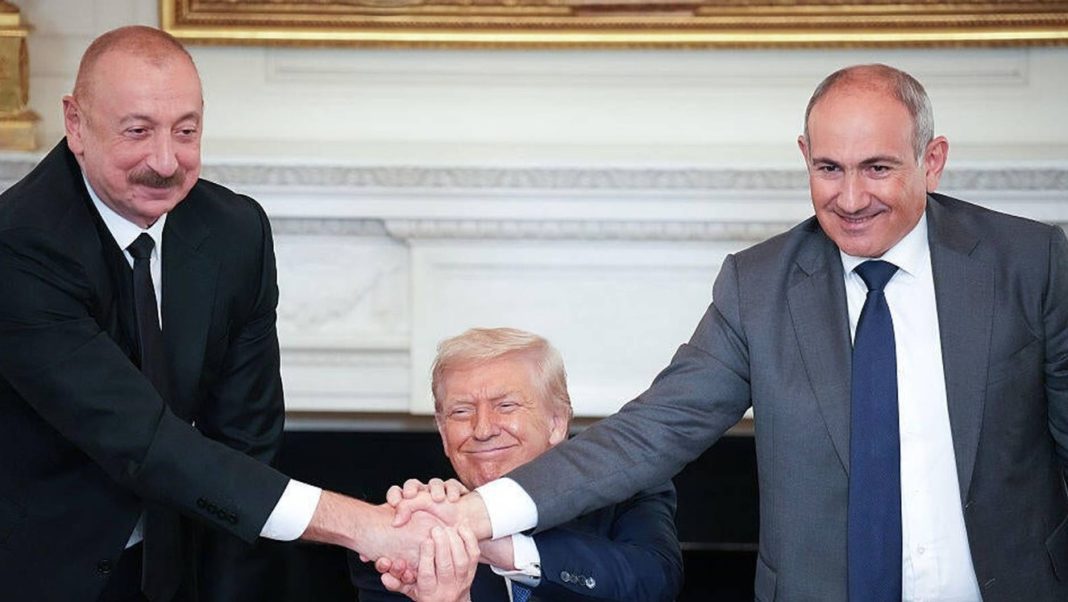In a major geopolitical shift, Armenia and Azerbaijan have taken a historic step toward ending 35 years of enmity by signing a peace deal in Washington. The agreement, brokered with direct involvement from US President Donald Trump, includes the creation of a strategic transport corridor along Iran’s northern border.
A Historic Peace Deal Alters the Regional Map
The corridor will pass through southern Armenia and link Azerbaijan with its exclave, Nakhchivan — a long-standing demand of Baku. Under the peace deal, a US private consortium will operate the route under Armenian sovereignty for 99 years. The plan includes roads, railways, oil and gas pipelines, and fibre-optic lines. Officials have named the route the “Trump Route for International Peace and Prosperity.”
This peace deal shifts the balance of power in the South Caucasus. For Iran, the project sparks fears that it will lose access to trade routes to the Black Sea and Europe via Georgia.
Some Iranian commentators have described the deal as “Iran’s geopolitical suffocation in the region.” The arrangement also weakens Russia’s influence, as Armenia moves closer to the West and the European Union.
Armenia Azerbaijan Peace Deal Faces Unexpected Challenges
Iran Voices Concerns Over Foreign Interference in Peace Deal
Tehran reacted sharply to the announcement of the peace deal. In a statement, the Iranian foreign ministry emphasised that countries must establish regional communication networks only within the framework of mutual interests, respecting sovereignty, and avoiding foreign interference.
Abbas Mousavi, former Iranian ambassador to Baku and current deputy presidential spokesperson, described Trump’s direct involvement as “interesting, offensive, and dangerous.” The proposed corridor will run just a few miles from Iranian territory, giving the US an economic and strategic presence directly on Iran’s border.
Sanctions Trap: UK Warns Georgia and Armenia Businesses—‘You Could Be Next!’
The United States says the peace deal will ensure unhindered connectivity between Armenia and Azerbaijan while respecting Armenia’s sovereignty and territorial integrity. But Tehran fears it could reshape trade patterns and bypass Iran entirely, especially with Armenia’s possible integration into the Middle Corridor — a trade route between Europe and China that avoids both Russia and Iran.
The corridor has been a major sticking point in peace talks between Armenia and Azerbaijan for decades. Now, with Washington taking the lead, Iran finds itself with little leverage to influence the outcome.
Russia’s Influence Erodes as Armenia Shifts Westward
The peace deal is also a blow to Moscow’s position in the region. Russia has historically been a key power broker in the South Caucasus and still maintains a military base in Armenia. However, its ongoing war in Ukraine has left it unable to counter Washington’s diplomatic push.
Armenia’s prime minister has been steering the Christian-majority nation toward stronger ties with Western institutions, including the European Union. This new peace deal accelerates that shift. For Russia, which has long used its influence in Armenia as a way to project power in the Caucasus, the change is significant.
The peace deal also removes other points of contention along the Armenia-Azerbaijan border. However, Azerbaijani President Ilham Aliyev has made it clear that Armenia must amend its constitution to remove what he calls “baseless territorial claims” against Azerbaijan. He has warned that failure to do so would be seen as “an act of disrespect” by the United States.
Aliyev has hailed the agreement, noting that it was pre-signed in Washington “in the capital of the No. 1 superpower” and in the presence of “the great president of the USA.” He also called for Trump to receive the Nobel Peace Prize for his role.
Tensions Rise Between Russia and Iran Over Zangezur Corridor
Turkey, a close ally of Azerbaijan, also stands to benefit from the new corridor, which could further strengthen its role in regional trade and energy routes. As part of the Washington accord, restrictions on US-Azerbaijan military cooperation will be lifted, giving Baku more options in defence partnerships.
With the “Trump Route” set to become a major transport and energy link, both Iran and Russia face the prospect of reduced regional influence. The project not only changes the physical map of the South Caucasus but also redraws its political and economic connections.
